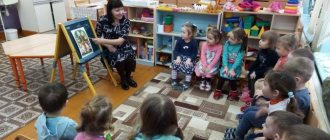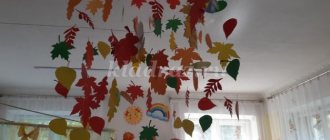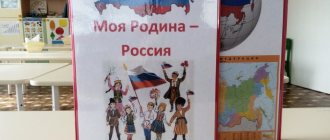Message to the teaching council: “Moral and patriotic education of children of the 1st junior group”
Message to the teachers' council.
Moral and patriotic education
children of the 1st junior group
Prepared by: Gopanenko S.V., teacher of MDOA “Kindergarten No. 18 “Rucheyok”, Novotroitsk”
We work in 1st junior group. The payroll is 28 people. Starting from an early age, we work on moral and patriotic education.
Today the words of N.A. sound very relevant. Dobrolyubova: “Reasonable education requires that already at a very early age, even before children become well aware of themselves, the desire for everything good, true, beautiful and noble is instilled in them; they, as if instinctively, should at this time get used to moral life. When self-consciousness subsequently develops in people who are accustomed to do good in this way, and they perform their duty, educated people, out of their own conviction, out of love, out of their own disposition, still in this case, early habits will serve as the basis on which life’s knowledge of morality and nobility is based.”
We carry out work on moral and patriotic education systematically and sequentially in blocks:
- "My family"
— teach children to name the names of family members, cultivate a sense of pride and respect for the older generation.
- "Our Moms and Dads"
- instill respect for parents and their work.
- "My dear home"
- instill love for your home, kindergarten, and cultivate a desire to help your family.
- "My city"
- introduce the name of your hometown, the flora and fauna, and cultivate a caring attitude towards nature.
We use such forms of work as classes, conversations, stories, role-playing games, didactic games, looking at illustrations, playing with building materials, observing living and inanimate nature, the work of adults, reading fiction.
In work on moral and patriotic education, we give a special place to works of children's fiction, Russian folk games, and oral folk art. We widely use all types of folklore (fairy tales, songs, proverbs, sayings, round dances, etc.). In oral literature, as nowhere else, the special features of the Russian character, its inherent moral values, ideas about goodness, beauty, truth, loyalty, courage, and hard work have been preserved. By introducing children to sayings, riddles, proverbs, and fairy tales, we thereby introduce them to universal moral values. In Russian folklore, words, musical rhythm, and melodiousness are combined in some special way. Nursery rhymes, jokes, and chants addressed to children sound like sayings, expressing care, tenderness, and faith in a prosperous future. Proverbs and sayings aptly evaluate various life positions, ridicule shortcomings, and praise the positive qualities of people. A special place in works of oral folk art is occupied by a respectful attitude towards work and admiration for the skill of human hands. Thanks to this, folklore is a rich source of cognitive and moral development of children. We held a lesson “Katya’s Birthday”, where the goal was to introduce children to the folklore works of the Russian people. To instill in children a love for their native language. Arouse children's interest and desire to play, create a joyful mood.
We have a group called “Our Fingers Dancing” in our group. Finger games give parents and educators the opportunity to play with their children, make them happy, and at the same time develop speech and fine motor skills. Such games form good relationships between children, as well as between adults and children. Finger games seem to reflect the reality of the surrounding world - objects, animals, people, their activities, natural phenomena.
An equally important condition for the moral and patriotic education of children is a close relationship with their parents.
The feeling of the Motherland... It begins in a child with his attitude towards his family, close people - mother, father, grandmother, grandfather. These are the roots that connect him with his home and immediate environment. In moral and patriotic education, the example of adults, especially close people, is of great importance.
Leo Tolstoy said: “Happy is he who is happy at home.” The formation of patriotic feelings occurs more effectively if the kindergarten establishes a close connection with the family. The need to involve the family in the process of familiarizing preschoolers with the social environment is explained by the special pedagogical capabilities that the family has and which cannot be replaced by a preschool institution: love and affection for children, the emotional and moral richness of relationships, their social rather than selfish orientation, etc. In its work with the family, the kindergarten should rely on parents not only as assistants to the preschool institution, but as equal participants in the formation of the child’s personality.
When working with parents, we use a variety of forms: we have a plan for working with the family, we hold parent meetings, conversations, individual conversations, we post information in the parent corner, we have prepared consultations for parents: “How to involve children in moral and patriotic education,” “How to raise a little patriot.” ", "Culture of traditions", "My dear Novotroitsk". We conducted a survey “Introducing children to traditional family culture,” training games and exercises aimed at improving child-parent relationships, and a photo exhibition “Me and My Family.”
Close cooperation between kindergarten teachers and family members
is expressed in the establishment of trusting business contacts with the families of pupils; providing parents with a minimum of psychological and pedagogical information, teaching them how to communicate with their child; ensuring regular interaction between children, teachers and parents; involvement of family members in the pedagogical process; creating a subject-based developmental environment in kindergarten and family. We will continue the work we started.




